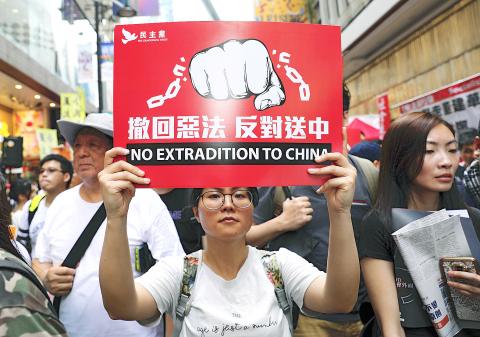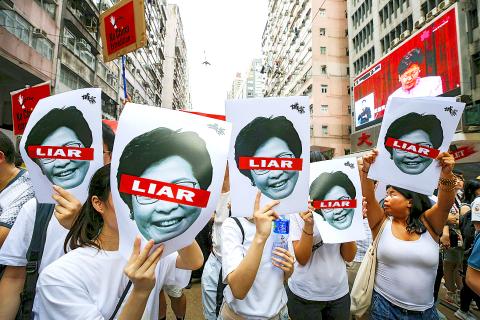Huge crowds yesterday thronged Hong Kong as anger swelled over a plan to allow extradition to mainland China, a proposal that has sparked the biggest public backlash against the territory’s pro-Beijing leadership in years.
Tens of thousands of people marched in blazing summer heat through the cramped streets of the territory’s main island in a noisy, colorful demonstration calling on the government to scrap its planned extradition law.
Hong Kong’s leaders are pushing a bill through the legislature that would allow extraditions to any jurisdiction with which it does not already have a treaty — including China for the first time.

Photo: AP
Coffee shop owner Marco Ng said he was closing his store to join the march.
“Our city matters more than our business,” the 26-year-old said. “If we don’t speak out, then there’s no way that the government will listen to our concerns.”
“The people’s voices are not being heard,” 18-year-old student Ivan Wong said. “This bill will not just affect Hong Kong’s reputation as an international finance center, but also our judicial system. That has an impact on my future.”

Photo: AP
The proposed law has sparked an opposition that unites a wide demographic, setting off the largest demonstrations since 2014 pro-democracy protests brought parts of the territory to a standstill for two months.
In the past few weeks lawyers have held sombre marches dressed in black, anonymous senior judges have given critical media interviews and the territory’s two main legal groups have urged a rethink.
Business figures are also rattled, with multiple chambers of commerce and commercial groups expressing alarm, adding to criticism from the US, Canada, former colonial power Britain and many European governments.

Photo: AP
Online petitions have been gathered by groups as diverse as stay-at-home moms, students, nurses and horse-racing fans.
Hong Kong’s leaders, who are not popularly elected, have said the law is needed to plug loopholes and stop the territory being a bolthole for Chinese fugitives.
They have said dissidents and critics would not be extradited, and have urged quick passage of the bill to extradite a Hong Kong man who is wanted in Taiwan for murdering his girlfriend.
However, critics fear the law would entangle people in China’s opaque and politicized court system and have said the government is using the Taiwan case as a Trojan horse.
The proposed law has been fast-tracked through the Hong Kong Legislative Council, which is dominated by pro-Beijing members and would on Wednesday receive its second reading.
The government has said it plans to have the law on the statute book by late next month.
Previous sessions in the legislature have descended into chaos, with rival lawmakers scuffling.
The march was seen by organizers as an attempt to showcase how wide the opposition to the bill is ahead of the second reading.
The backlash creates a headache for Hong Kong Chief Executive Carrie Lam (林鄭月娥), who has staked her political reputation on the bill passing.
Pushing through the legislation could spark more protests or even a return to the unrest of 2014 — but backtracking might embolden opponents and anger Beijing.
Several senior Chinese Communist Party leaders have voiced support for the bill.

‘ABUSE OF POWER’: Lee Chun-yi allegedly used a Control Yuan vehicle to transport his dog to a pet grooming salon and take his wife to restaurants, media reports said Control Yuan Secretary-General Lee Chun-yi (李俊俋) resigned on Sunday night, admitting that he had misused a government vehicle, as reported by the media. Control Yuan Vice President Lee Hung-chun (李鴻鈞) yesterday apologized to the public over the issue. The watchdog body would follow up on similar accusations made by the Chinese Nationalist Party (KMT) and would investigate the alleged misuse of government vehicles by three other Control Yuan members: Su Li-chiung (蘇麗瓊), Lin Yu-jung (林郁容) and Wang Jung-chang (王榮璋), Lee Hung-chun said. Lee Chun-yi in a statement apologized for using a Control Yuan vehicle to transport his dog to a

BEIJING’S ‘PAWN’: ‘We, as Chinese, should never forget our roots, history, culture,’ Want Want Holdings general manager Tsai Wang-ting said at a summit in China The Mainland Affairs Council (MAC) yesterday condemned Want Want China Times Media Group (旺旺中時媒體集團) for making comments at the Cross-Strait Chinese Culture Summit that it said have damaged Taiwan’s sovereignty, adding that it would investigate if the group had colluded with China in the matter and contravened cross-strait regulations. The council issued a statement after Want Want Holdings (旺旺集團有限公司) general manager Tsai Wang-ting (蔡旺庭), the third son of the group’s founder, Tsai Eng-meng (蔡衍明), said at the summit last week that the group originated in “Chinese Taiwan,” and has developed and prospered in “the motherland.” “We, as Chinese, should never

‘A SURVIVAL QUESTION’: US officials have been urging the opposition KMT and TPP not to block defense spending, especially the special defense budget, an official said The US plans to ramp up weapons sales to Taiwan to a level exceeding US President Donald Trump’s first term as part of an effort to deter China as it intensifies military pressure on the nation, two US officials said on condition of anonymity. If US arms sales do accelerate, it could ease worries about the extent of Trump’s commitment to Taiwan. It would also add new friction to the tense US-China relationship. The officials said they expect US approvals for weapons sales to Taiwan over the next four years to surpass those in Trump’s first term, with one of them saying

INDO-PACIFIC REGION: Royal Navy ships exercise the right of freedom of navigation, including in the Taiwan Strait and South China Sea, the UK’s Tony Radakin told a summit Freedom of navigation in the Indo-Pacific region is as important as it is in the English Channel, British Chief of the Defence Staff Admiral Tony Radakin said at a summit in Singapore on Saturday. The remark came as the British Royal Navy’s flagship aircraft carrier, the HMS Prince of Wales, is on an eight-month deployment to the Indo-Pacific region as head of an international carrier strike group. “Upholding the UN Convention on the Law of the Sea, and with it, the principles of the freedom of navigation, in this part of the world matters to us just as it matters in the